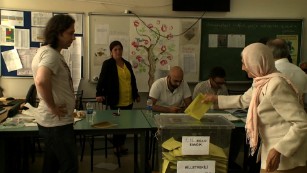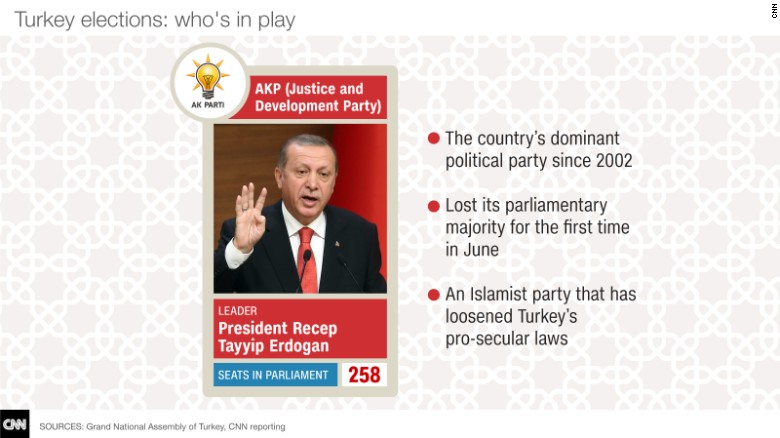Turkey's ruling party wins big
Voters delivered a surprise win for Turkey's ruling Justice and Development Party, or AKP, in elections on Sunday.
In a major comeback from the previous general election, the AKP, led by Prime Minister Ahmet Davutoglu, seems to have secured a large enough majority of seats in parliament for single-party rule, according to preliminary results released by the semiofficial Anadolu News Agency.
The preliminary results from Sunday's vote show the AKP securing 316 seats in parliament, more than the 276 seats needed for single-party rule but shy of the 330 seats needed to take constitutional changes to referendum without reaching out to other parties.
Speaking from his hometown of Konya, Davutoglu hailed the outcome as a "day of victory" and said "our democracy has won."
The center-left Republican People's Party, or CHP, came in second place, receiving 134 seats. It was followed by the pro-Kurdish, leftist Peoples' Democratic Party, or HDP, with 56 seats. Next came the right wing Nationalist Movement Party with 41 seats, according to the preliminary results.

Turkey holds snap parliamentary election
In June, the AKP failed to get enough votes to form a government and coalition attempts failed to seat a Cabinet. That vote struck a stunning blow to more than 12 years of dominance in parliament by the AKP, founded by President Recep Tayyip Erdogan. Analysts predict that the renewed mandate for the AKP could to revive efforts by Erdogan to transform the Turkish government into a presidential system.
Opinion polls and analysts ahead of the elections had predicted a repeat of June's results and failed to forecast the nearly 9% increase in the AKP's votes.
Suicide bombing worsened divisions
The most brutal blow to Turkey's body politic during the period came three weeks ago when two ISIS suicide bombers killed more than 100 people at a peace rally in the heart of the capital, Ankara.
Rather than shocking people into a unified stance, the horrific bombings only seemed to exacerbate bitter divisions. Opposition members blamed the government for not securing the rally and renewed allegations of the AKP turning a blind eye to ISIS operating in Turkey.
The attack, the deadliest attack in modern Turkish history, targeted a demonstration by leftists and trade union members calling for an end to fighting between the government and Kurdish militants.
The fragile ceasefire with the Kurdistan Workers' Party, or PKK, crumbled in July. The PKK accused the Turkish government of colluding in a suicide bombing that killed more than 30 people who were organizing an aid delivery to Kobani, a town inside Syria that Kurdish fighters took from ISIS earlier this year. Authorities blamed ISIS militants for the attack.
The PKK, which has fought against the Turkish state for decades, killed two police officers in retaliation over the bombing, setting off a new spiral of violence. Turkey began bombing PKK positions in northern Iraq and inside its own borders. Street-to-street fighting has turned parts of the southeast into battle zones.
Turkey began trying to clamp down on different groups the government considers to be terrorist organizations.
Security sweeps take place regularly across Turkey, with large numbers of people detained. Opponents of the AKP have said the government has been using the fight against terror to stifle dissident voices in the news media and using the politics of fear to gain votes while ignoring the growing ISIS threat.
Though AKP has managed this strong showing at the polls, the country remains bitterly divided over the government's handling of the PKK as well as foreign policy toward the war in Syria that has invariably spilled across its own borders.
"How can Turkey overcome this polarization? It's difficult to say," wrote Sinan Ekim and Kemal Kirisci in a recent analysis for the Brookings Institution. "What is certain is that distancing Turkey from the brink of a civil war will be one of the greatest challenges for the country's next administration."
News Courtesy: www.cnn.com











